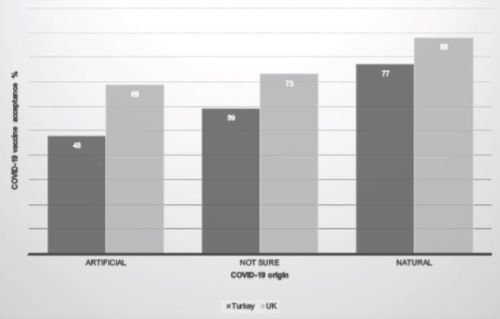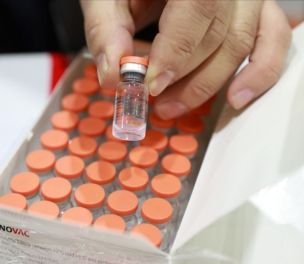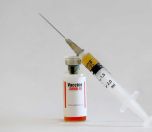* Image: Pixabay
Click to read the article in Turkish
Gül Deniz Salalı from the Department of Anthropology of University College London (UCL) in the United Kingdom (UK) and Mete Sefa Uysal from the Department of Psychology of Dokuz Eylül University in Turkey conducted a joint study with the aim of investigating the relationship between COVID-19 vaccine hesitancy and beliefs about the origins of the disease.
With this aim in mind, they did an an anonymous online survey throughout May 2020 in the UK (with 1,088 participants) and Turkey (with 3,936 participants), gathering information on participants' willingness to vaccinate for a potential COVID-19 vaccine and beliefs on the origin of the virus. All participants were above 18, residing either in the UK or Turkey.
The results of the survey published in the Psychological Medicine journal have shown that COVID-19 vaccine hesitancy was higher in Turkey. 31 percent of the participants in Turkey and 14 percent in the UK were unsure about getting themselves and, if they have, their children vaccinated.
* Percentage of participants who responded "yes" to the question of whether they would vaccinate themselves and their children for COVID-19 in Turkey and the UK based on their belief on the origin of the coronavirus (artificial, not sure, natural).
Belief in a natural origin leads to acceptance
In both countries, 3 percent of the participants rejected being vaccinated.
When they were asked about the origin of the disease, more participants in the UK believed in the natural origin of the virus; while 54 percent in Turkey believed that it was caused by natural reasons, this rate was 63 percent in the UK. 18 percent in Turkey and 12 percent in the UK thought the origin of the disease to be artificial, namely human-made.
The study has shown that COVID-19 vaccine acceptance rates were higher among the participants who believed in the natural origin.
That is, odds of vaccine acceptance were 26 percent higher in Turkey and 63 percent higher in the UK if a person believed in the natural origin, compared to those who were not sure about the origin.
Effects of anxiety and gender
The participants of the survey who had higher COVID-19 related anxiety scores had higher odds of vaccine acceptance.
According to the study, compared to women, men in Turkey were more likely to accept a COVID-19 vaccine and believe in the natural origin of the virus. Having a graduate degree and children decreased the odds of vaccine acceptance in Turkey, but not in the UK.
'Concerning levels of hesitancy in Turkey'
In their study, the researchers have raised concerns about the "concerning levels of COVID-19 vaccine hesitancy," especially in Turkey:
"Much research effort is focused on developing an effective vaccine for combatting COVID-19. Vaccine development itself, however, will not be enough given that a sufficient amount of people will need to be vaccinated for widespread immunity. Vaccine hesitancy is on the rise, varies across countries, and is associated with conspiratorial worldview.
"Our results point at a concerning level of COVID-19 vaccine hesitancy, especially in Turkey, and suggest that wider communication of the scientific consensus on the origin of the novel coronavirus with the public may help future campaigns targeting COVID-19 vaccine hesitancy." (TP/SD)










